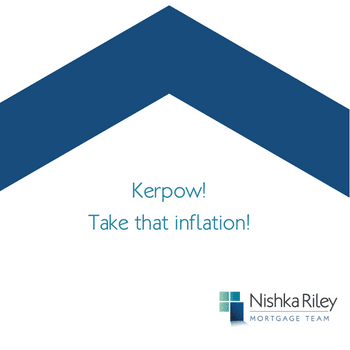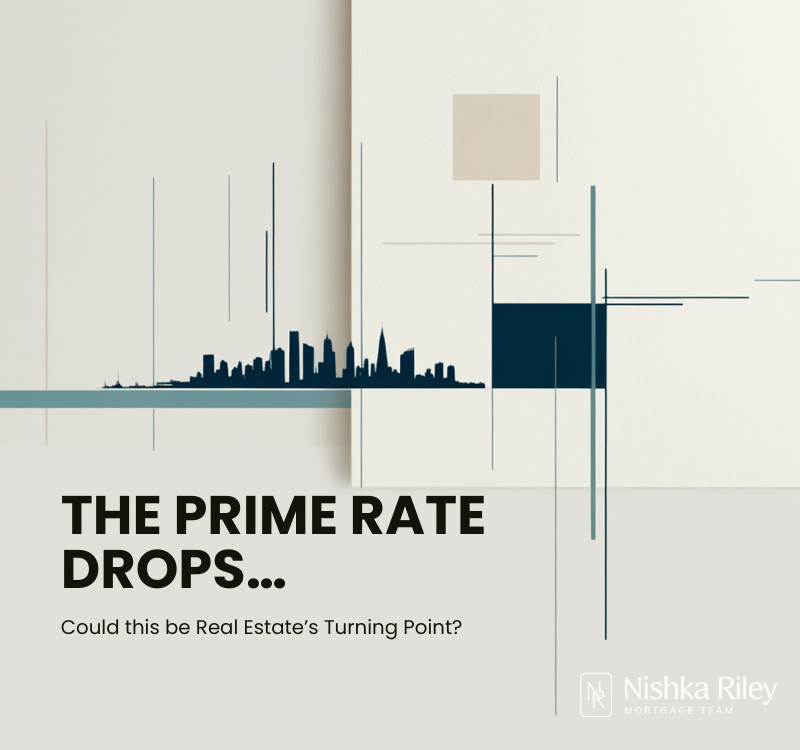
Mortgage Rate Update – Unprecedented Stimulus, Unprecedented Tightening.
June 1, 2022
Mortgage Rate Update – Maybe This Time?
September 7, 2022The Bank of Canada (BOC) made the preemptive/scorched earth decision to raise the prime interest rates today by 1%. Combined with the continued decrease in your RRSP / TFSA portfolios, and it would seem this summer will be remembered more as a cold dark winter.
Why would they make such a dramatic increase? Will it end? Is the housing market going to crash? Will I ever sleep again?!
These are the questions my team and I are answering daily. And to be honest, I’m a little rattled myself. So instead of my usual update, I’ll try my best to answer the above four questions, interlaced with some economic stats/observations.
Be warned this post will be longer than usual.
Question 1 – Why such a dramatic increase:
The quick answer is to scare the daylights out of you so you stop spending money.
The longer explanation is that inflation is a lagging indicator. As mentioned in today’s BOC press release, the decision to raise rates today was based on April’s economic report and some preliminary data from June. Compounding this lagging indicator is that it takes six months to a year before an increase in the prime rate affects the economy. This means that Governor Tiff has to anticipate where inflation is going based on old data and make a corrective decision today that won’t have an impact, if he’s lucky, until six months from now! It’s like James Bond firing a bullet in slow motion – trying to take out the tire of the bad guy’s car, who won’t be driving by until next week. Governor Tiff has seen this movie before in the 80s, and when the protagonist in that story waited too long to take “the shot” – things got ugly. There is good news; if Governor Tiff does raise too fast, he can lower them just as quickly. And because rate decreases take effect much quicker, it will be easier to fix the overshoot. For example, when rates rose to their highest in the 80s, one month later, they decreased and kept decreasing for the next four meetings.
So that leads me to explain the real tool that Governor Tiff wields, which is the power of the press release. With that he can scare you into believing that you should stop spending now because more increases are coming, and you can trust the media will run with that story, narrating all sorts of disasters on the horizon, painting a picture of doom and despair. And as we know, fear spreads much faster and can have a much quicker impact.
Question 2 – Will It End?
Yes, but…
We might see one or two more rate increases, but they will be smaller and as mentioned above, potentially followed by a rate decrease. In today’s press release, the BOC discussed how they expect inflation to slow in the coming 3rd quarter and expect the economy to grow by a mere 1.75% in 2023. That statement alone should give you hope that Tiff will ease off the breaks this year and roll back some of the rate hikes in 2023.
What does that look like for your mortgage? I would anticipate that by October, we will see fixed rates begin a gradual decrease ( some lenders are starting to offer unadvertised fixed rate specials ), and by 2023, when the costs of funds have become more predictable for the banks, we’ll see rates begin to return to normal. What is normal you ask? I would say that a 5 year fixed rate mortgage at 3.39% would be average and 2.99% would be a really good mortgage rate. As I pointed out in my last update, banks have added a 1% premium to all their fixed rates due to how quickly the cost of funds has changed. Once things calm down, the banks can remove that premium. Because of this, we continue to recommend that clients that are purchasing or refinancing choose a variable mortgage. And for those clients that are in a variable mortgage, continue to remain in a variable. And for anyone with a mortgage coming due in the next 6 months or more, to stay the course until your maturity.
Question 3 – Is the housing market going to crash?
Manulife Bank did a survey a while ago during an economic downturn that caught my attention. In it, 75% of respondents were confident with their financial situation; however, 90% were worried that their neighbours might be on the brink of financial trouble. It made me chuckle because it is a testament that we are all going to be okay.
Here is why housing will weather this storm. Since 2017 every Canadian purchasing or refinancing a home has had to qualify at the higher of: 1. the rate they got from the bank plus 2% OR 2. the bank stress test rate, which for the most part has been 5.25%. Coincidentally the 5.25% is virtually on par with today’s 5 year fixed. So no, people won’t be selling their homes when their mortgage matures. They may have to let go of that fancy car lease or cut back on a vacation or two, but their home is safe. Will prices soften? Absolutely, and that’s okay because it’s part of the market cycle. Given the extreme amount of transactions over the past two years, my team and I have been anticipating a slow down in the market for 2022 long before the inflation concerns were front page news. The simple reason is everyone who wanted to move has moved.
Will this turn into a 2008 Financial crisis type crash? No, for two reasons. First what caused the housing crash in 2008 in the US was people qualifying at ultra low introductory rates and then not being able to make mortgage payments when the introductory rates expired. The second reason is we have had the stress test for five years now, which I would estimate that 70% of current homeowners have had to jump over to get into their home. What about the remaining 30%? They are sitting on a mountain of home equity and a much lower mortgage balance, so they will be fine.
Are there opportunities to be had? I would expect so in the following segments:
The fixer-upper: Since the housing market will be more competitive the fixer-upper could be overlooked. We have access to lenders and programs that can finance minor renovations at the time of purchase, reducing the amount of money you’ll need to get the project done. Don’t overlook that diamond in the rough!
Condos: As affordability decreases, buyers get pushed down the housing ladder. Given that location is the mantra of real estate, purchasing a condo will be the only viable option for buyers to stay in the area they want to live in.
Rentals: Because of the current level of uncertainty, people are putting off their home-buying decision. This means the rental market will remain tight over the next few years. Because of how we can factor in the rental income into the application, qualifying to buy a rental property is actually easier than qualifying for a principal residence. We can even use the equity in your to finance the downpayment.
Accessing the equity in your home: If you retiring in the next 5 to 7 years, now is the time to set up a line of credit to access the equity while your property is at its maximum value. And because of the proposed banking rules that are coming in 2023, this will allow you to be strategically positioned to plan your income needs. It will also allow your investment portfolio to recover from the recent market downturn.
Question 4 – Will I ever sleep again?!
The short answer is yes. Take comfort that rates have not climbed to some astronomically high levels. Back in July 2018, the BOC raised rates to 3.70%. Yes, we are now at 4.7%, but we are also 3/4 into the fight with inflation. I feel that because the next BOC meeting is in September, this will allow time for the previous rate holds to start taking effect.
Looking back over the past 18 years, increases in the prime rate usually occur gradually over 18 months, but once rates reach their top, they often start to decrease five months later. Given the size and speed of the recent increases, it would be fair to say we have covered the equivalent of a year in the past four months. That means we should have only three or four months left at this level, and then we might see our first rate decrease in March of 2023.
Hopefully, after reading this update you are feeling more confident, and truly believe that the world is not going down in flames. Trust that we are closer to the end than the beginning, and that being in a mortgage product that positions you for the future rate decreases in 2023 is more important than trying to lock in a rate now.
Thanks for reading
Sleep tight…and don’t the bed bugs bite!

PS. If still having problems sleeping Pascoflair is an excellent herbal remedy that I use to calm down before I go to sleep. Balanced Health and Integrative Pharmacy on Lonsdale usually carry it and they provide excellent advice.
The next Bank of Canada meeting is September 7th, 2022
Did you Like this post? Then you’ll Like my Facebook Page. It’s filled with current news on what’s going on in the world of real estate.




